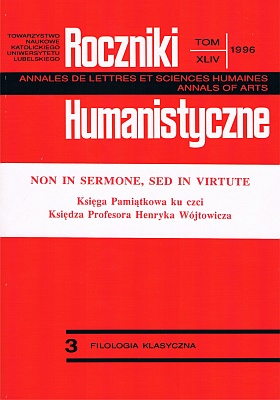The Inventive Motifs in the First Book of Tertullian's Ad nationes
Abstract
The paper seeks to reveal the inventive and compositional scheme of the first Tertuallian's apology, referring it to other texts of this author, which appeared later and were more mature. We mean here Apologeticus and Ad Scapulam, addressed to pagans.
We notice here a considerably weaker ordering of the thematic and compositional aspect, as regards the requirements of rhetoric. In Ad nationes one can notice the main argumentative motif, as in the mentioned apologies, namely the motif of knowledge. It concentrates the whole line of argumentation of the message and in like manner submits the extremely varied subject matter under discipline. In the compositional layer we find, obviously, in the introductory and final parts, but the motif initiates also new questions, sums them up or binds them with others. The great wealth of means of expression is manifested in the ways the main thread of knowledge is supported: ranging from unambiguous, easy to read, texts, through synonyms and periphrases, to consciously applied by Tertullian symbolism of impression which were used to describe Christians.
Copyright (c) 1996 Roczniki Humanistyczne

This work is licensed under a Creative Commons Attribution-NonCommercial-NoDerivatives 4.0 International License.





